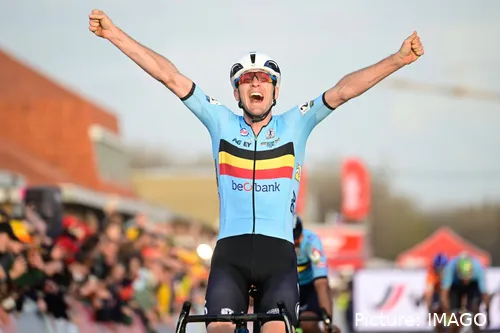He says he always feared the two lost seasons would permanently damage his level, but the European title proved something to himself as much as to others. “For a long time it was a huge question mark, but I can now say that I’m back at my level. The life lessons of the past few years definitely contributed. I’m far from burnt out, something that might start creeping in for other riders of 32.”
“I did endless research… a needle in a haystack I’ll never find”
Aerts admits he was consumed by the search for an explanation after letrozole was found in his urine following Flamanville in 2022 — research that eventually took a psychological toll.
“Until six months ago I was still working on it every day. I did endless research into the substance and what it was used for — apparently mostly in livestock farming. In the meantime I’ve let it go: it wasn’t making me happy. It’s a needle in a haystack I’ll never find.”
He still believes contamination is the only plausible explanation. “I have two theories: either it came from contaminated supplements, or from that place in France — a year later it turned out that Shari Bossuyt also tested positive there. But we weren’t able to substantiate our suspicions enough to obtain an acquittal.”
Even his much-discussed “Normandy milk” hypothesis was simply an attempt to impose logic on something that felt inexplicable. “Is it a coincidence that something was found in both Shari and me? We don’t know. But I have to look for the cause somewhere. Otherwise it’s impossible to live with.”

Toon Aerts emotionally returned to the top with his European Championship victory
“They know I did nothing wrong” – Aerts on the UCI and the presumption of guiltIn one of the interview’s most striking passages, Aerts insists cycling’s governing body already acknowledged he had no intent to cheat: “The UCI wrote in its report that it involved unintentional use. In other words: I never intended to ingest that substance. They know I did nothing wrong. That’s also why they granted me a favour: my suspension was reduced from four years to two.”
But he is blunt about what that reduction really meant: “Whether all of that is correct? You can ask questions about it.”
And he is equally clear about the impossible burden placed on riders who must prove a negative: “I had to investigate myself how something I never wanted in my body ended up there. I’ve never ordered anything from dodgy websites. Everything came from the team. I always tried to protect myself as well as possible and did what I thought was right. Still, something went wrong somewhere. If I’d been able to prove in black and white what caused it, I’d never have been suspended for two years.”
Taking the fight further was never realistic — financially or practically. “Aside from the financial aspect, an appeal wouldn’t have achieved much. The UCI’s final ruling only came after a year and a half. At that point I had only six months of suspension left. I wasn’t going to throw thousands more euros at it. It had cost me enough.”
“I often trained out of revenge… anger solves nothing”
Aerts admits he initially returned to racing with fury in his legs. “After my suspension I was initially convinced that it would soon become clear that everything was a misunderstanding. I often trained out of revenge back then. Even my first races, when I was allowed to compete again, I rode with aggression.”
But he quickly realised anger was corrosive. “I noticed that doesn’t work: anger solves nothing. I shouldn’t lower myself to declaring more war on the authorities that punished me. I have too much respect — respect they didn’t show me.”
Instead, he forced himself to accept that only he could decide how the story would continue. “Suddenly I had to sort myself out and think and act like a real adult. Part of being an adult is not kicking back. Others had my fate in their hands: it’s up to them to feel remorse now and to learn the right lessons so others don’t become victims too.”
“I’ve shown the cycling world that I’m back”
For Aerts, Middelkerke was the moment the weight of the last four years finally lifted — the moment he could look the sport in the eye again. “I’ve shown the cycling world that I’m back. I’m proud of that. And proud of the team around me.”
And after everything he endured — the uncertainty, the financial damage, the suspicion, the search for answers that may never come — he is finally able to say he is leaving the darkest chapter behind him.
Redemption, for Toon Aerts, isn’t an abstract idea. It’s something he had to win back, metre by metre, after nearly being driven out of the sport entirely.
